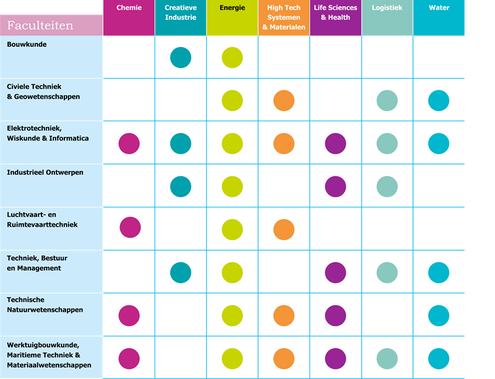National cooperation
TU Delft works intensively with other organisations. This cooperation takes many forms, from one-time exchange to joint research projects and shared research institutes. The examples below are certainly not exclusive. In these and other areas, all sorts of teams within the university develop strategic partnerships with other universities, government institutions and private and social partners.
In choosing research topics, TU Delft matches the national agenda on science and innovation policy. The NWO and the Top Sector policy, are important drivers in this. The issues and routes in the Dutch National Research Agenda also play a leading role in organizing our thematic research.
TU Delft is keen to play a prominent role in the Top Sectors defined by the Dutch government. In each top sector, the programmed research spans the entire range, from curiosity-inspired to application-driven. The scientific contributions to these sectors are specified in innovation contracts with government and the business community. TU Delft is making a substantial contribution to 7 of the 9 economic top sectors: Water, Energy, High-Tech Systems and Materials, Life Sciences, Chemicals, the Creative Industry and Logistics. The diagram below shows which of our faculties are involved with each of the economic top sectors.

4TU.Federation
On a national level, TU Delft cooperates with the other technical universities in the Netherlands, Eindhoven University of Technology, University of Twente and Wageningen University, in the <link en research thematic-cooperation cooperation-of-universities>4TU.Federation. The four universities are jointly committed to strengthening and pooling their technical knowledge, sometimes via the 4TU Research Centres.
Research schools
TU Delft participates in fifteen national <link en research thematic-cooperation research-schools>research schools and is coordinating five of those research schools. A research school combines research with the education of researchers in a given scientific area and contributes to the national coordination of research programmes within specific disciplines.
National innovation programmes and research institutes
TU Delft cooperates with national partners in high profile research-led collaborations such as the Institute for Advanced Metropolitan Solutions (AMS) – a scientific institute located in Amsterdam where TU Delft works together with amongst others Wageningen University, MIT and TNO. The institute is initiated by the city of Amsterdam. In the Netherlands Institute for Conservation Art and Science (NICAS) – a research centre where TU Delft works in cooperation with the University of Amsterda (UvA), the Rijksmuseum and the Cultural Heritage Agency of the Netherlands (RCE) – innovative research within art history, conservation and science are brought together. The public private partnership CatchBio, ‘Catalysis for Sustainable Chemicals for Biomass’, with Dutch universities, research institutes and industries, aims to develop clean and efficient processes for biomass conversion into low-cost and sustainable biofuels, chemicals and pharmaceuticals. Several research groups of TU Delft participate in The Institute for human Organ and Disease Model technologies (hDMT). Within this precompetitive non-profit consortium, experts from science, applied science organisations and industries work together on ‘Organ on chip’ technology to gain new insights in human disease, and to develop new treatments and diagnostic tests. In the research and investment program ADEM, The Energy Research Centre of the Netherlands (ECN), three Dutch Technical Universities (TU Delft, Eindhoven University of Technology and University of Twente), industrial partners and the Dutch government combine their strengths to develop materials needed for the transition towards sustainable energy resources. GROW is a consortium of about 20 research institutes and companies in the offshore wind sector in the Netherlands, that jointly work to reduce the cost of offshore wind and to increase the value in the energy system and in the ecosystem. Mainport Innovation Fund II is a partnership of TU Delft, KLM, Schiphol Group, NS and Port of Amsterdam. The fund focuses on innovation in Logistics, Transport and Aviation including sustainable infrastructure and materials. Within Climate Campus, a partnership of over 40 parties – government institutions, educational instiutions, firms and environmental organisations – knowledge and technology is developed and applied to make the IJssel-Vecht Delta resilient to climate change.
Those are just some examples. TU Delft works intensively with diverse partners in many other projects.